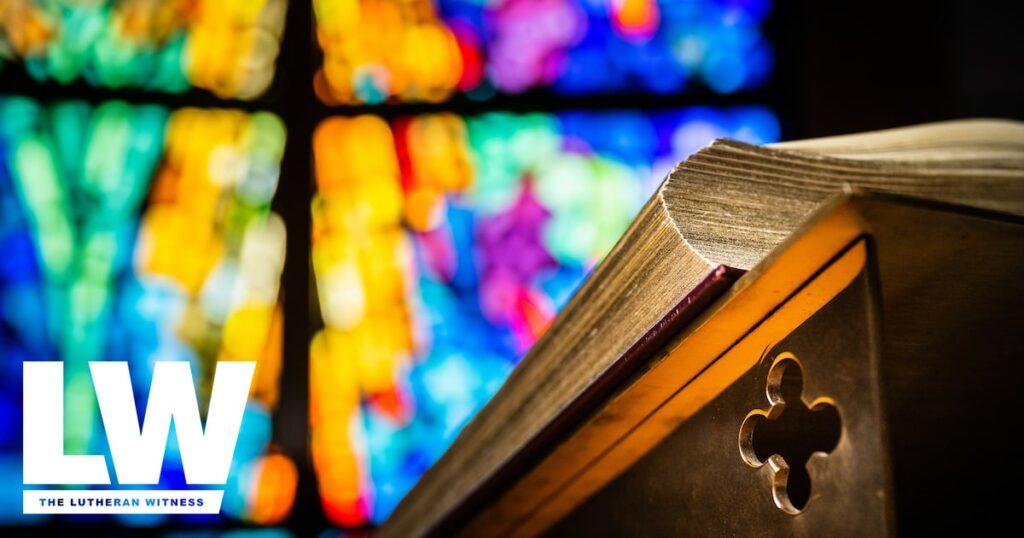by Rev. Matthew Harrison
“It is always a sign of a deep spiritual sickness when a church forgets its fathers” (Hermann Sasse). Why? Because the life of the Church on this earth is always a forward trajectoryinformed by, pushed forward by, anchored by the past. Life, and especially the Christian’s life of repentance and faith, is a constant review of events occurredsin committed, lived, suffered and confessed for forgiveness. What remains of yesterday’s life is not to be a burden. Forgiveness is all about freedom, relieving the burden for the sake of today’s confident trek into the future, all under God’s grace. The eye on the past is a lesson learned for tomorrow. To know where we are going, we’d better have some idea whence we’ve come.
The greatest eras in the Church, the great times of advancement, always begin with the cry, “Back to the Scriptures!” “Back to the fathers!” “Back to Luther!” Note how often God’s faithfulness to our “fathers” is mentioned in the Psalms as a comfort to give courage in the present. “In You our fathers trusted. They trusted and You delivered them” (Ps. 22:4). Hilkiah found the lost Book of the Law (Deuteronomy?), and good King Josiah commenced a time of repentance and restoration (2 Kings 22).
Jesus anchored His ministry in the ancient prophets: “Today this scripture [Isaiah] is fulfilled in your hearing” (Luke 4:21). The ancient words of the Fathers were on the lips of Jesus at all the decisive moments of His life sacrificed for us: “My God, My God! Why . . .” (Ps. 22:1; Matt. 27:46). John the Baptizer was the “voice crying in the wilderness” spoken of by Isaiah (Matt. 3:3; Is. 40:3). Luther’s message was “Back to the Scriptures!” and an explosion of fidelity to and understanding of the pure Gospel commenced. The greatest forward advancement of the Gospel has always begun with the cry, “Back to the Scriptures! Back to the fathers!”
C. F. W. Walther was a reformer in this tradition. “Gottes Wort und Luthers Lehr, vergehet nun und nimmermehr!” (“God’s Word and Luther’s doctrine shall not pass away now or forever!”) That’s the statement Walther put on the masthead of his newspaper, Der Lutheraner (“The Lutheran”) already in 1844.
The ravages of the Enlightenment had reached a low point in the German church just as Walther left Germany with a strange and even fanatic expedition bound for failure. But out of the wreckage, Walther was thrown upon Scripture, the Lutheran Confessions and the writings of Luther. “Back to Luther!” And from the ruins of failure came new life, new beginnings. “When God makes alive He does it by killing” (Luther’s Works, v. 33, p. 62). The result was this Missouri Synod.
By God’s grace, and a lot of help from other faithful men and women, Walther founded a church in 1847 squarely and firmly upon the sacred and inerrant Scriptures and the Lutheran Confessions with a conviction that Luther got the Gospel right. Sasse once pointed out that largely because of the tenacity of Walther and the Missouri Synod, all of American Lutheranism had formally accepted the entire Book of Concord by the 400th anniversary of the Reformation in 1917.
We’ve wavered now and then. But the foundation was built so well that today, 164 years laterdespite all our many weaknesses and faultsthe LCMS remains committed to the same confession of faith because it’s true.
As we push forward under the grace of God, let’s recheck our foundation this 200th anniversary of C. F. W. Walther’s birth. If we fail to understand Walther and our roots, what we build today may well squander what was given us by our fathers. And what we build today may look ever so marvelous and 21st-century-sleek, but soon may be frayed and flapping in the wind with no enduring basis.
“Forward” I say! And that means back to Walther! And Walther will tell us, “Back to Scripture! Back to the Lutheran Confessions! Back to Luther!”
—
Recommended Walther Readings
-
Law and Gospel: How to Read and Apply the Bible (CPH, 2010).
-
August Suelflow, Servant of the Word: The Life and Ministry of C.F.W. Walther (CPH, 2000).
-
Church and Ministry [Kirche und Amt] (CPH, 1987).
-
Duties of an Evangelical Lutheran Synod, in At Home in the House of My Fathers (CPH, 2011), pages 224330.
-
The Synod Has No Power but the Word of God, in At Home in the House of My Fathers (CPH, 2011), pages 19.
-
Why Should Our Pastors and Teachers . . . Subscribe Unconditionally to the Symbolical Writings of Our Church? in At Home in the House of My Fathers (CPH, 2011), pages 119137.
-
On Pure Doctrine for the Salvation of Souls, in At Home in the House of My Fathers (CPH, 2011), pages 193201.
-
Theses on Communion Fellowship, Essays for the Church (CPH, 1992), v. 1, pg. 202228.
- Walthers Breakdown, in At Home in the House of My Fathers (CPH, 2011), pages 142145.
—
Lets go! Mark 1:38
> Email: president@lcms.org
> Web page: www.lcms.org/president
> Blog: www.wmltblog.org
October 2011





